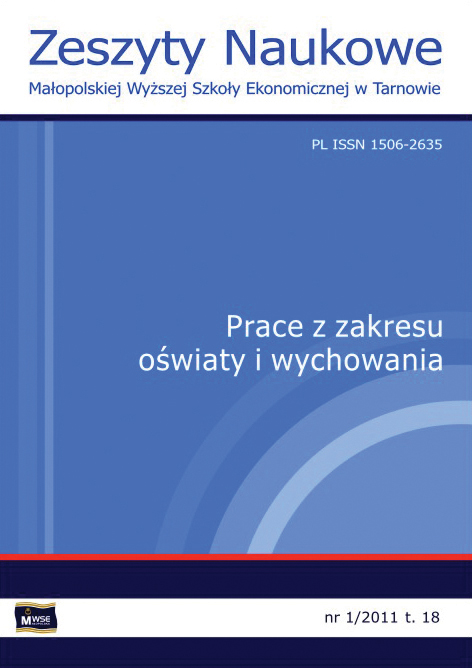Abstract
The purpose of this article is to introduce the readers to the reading process as a multifaceted problem, which is the psycho-physical, intellectual, and cultural process. The process of reading can be so construed as psychophysical activity, influencing by the training on its speed, which on one hand allows to explore a larger number of texts, and on the other hand deprives the reader the pleasures of the text and provides the risk of anxiety or even depression. Reading can also be treated as an intellectual activity carried out in accordance with accepted procedures of exploring the text, as the purpose of its fair study. Reading also can be understood as an intellectual event in the cultural field not subject to any procedures, but still insightful, emotional and personal, allowing to see the hidden contents, reading a variety of cultural messages, thanks to active attitude of the reader. The student’s reading workshop is not only a process of reading text but also the ability of its critical analysis and interpretation. Therefore reading with understanding, temperamental, innovative, critical as well as the creation of different varieties of reader’s attitudes towards the text should be one of the tasks of academic teaching.
References
Duraj-Nowakowa K. 2003. Studiowanie literatury przedmiotu. Kraków: Wyd. Uniwersytetu Jagiellońskiego. ISBN 83-233-1543-4.
View in Google Scholar
Krysiak W. (wybór i oprac.). 1996. Metodyka pracy umysłowej (wypisy). Szczecin: TWP; IP WSP. ISBN 83-86992-05-0.
View in Google Scholar
Krysiak W. (wybór i oprac.). 1998. Uczyć się uczyć (wypisy). Szczecin: Pedagogium – Oddział Regionalny TWP. ISBN 83-87561-002.
View in Google Scholar
Kuhn T. 1985. Dwa bieguny. Tradycja i nowatorstwo w badaniach naukowych. Amsterdamski S. (przeł.). Warszawa: PIW. ISBN 83-06-01097-3.
View in Google Scholar
Osmelak J. 1980. Jak się uczyć samodzielnie. Warszawa: Instytut Wydawniczy CRZZ. ISBN 83-202-0022-9.
View in Google Scholar
Półturzycki J. 1997. Jak studiować zaocznie. Poradnik metodyczny. Toruń: Wyd. Adam Marszałek.
View in Google Scholar
Witkowski L. 2001. O zaniedbaniach kategorialnych i teoretycznych pedagogiki w Polsce. W: Nalaskowski A., Rubacha K. (red.). Pedagogika u progu trzeciego tysiąclecia. Toruń: Wyd. Uniwersytetu Mikołaja Kopernika. ISBN 83-231-1333-5.
View in Google Scholar
Witkowski L. 2004. W poszukiwaniu nowoczesnej formacji intelektualnej w polskiej pedagogice. W: Lewowicki T. (red.). Pedagogika we współczesnym dyskursie humanistycznym. Warszawa–Kraków: WSP ZWP, Impuls. ISBN 83-7308-413-4.
View in Google Scholar
Witkowski L. 2007. Wstęp do fenomenologii czytania (uwagi nie tylko seminaryjne). W: Witkowski L. Między pedagogiką, filozofią i kulturą: studia, eseje, szkice. T. 3. Warszawa: Instytut Badań Edukacyjnych. ISBN 978-83-87925-86-4.
View in Google Scholar
Zarębska-Piotrowska D. 2004. Prośba o (nie) szybkie czytanie. "Konspekt", nr 18.
View in Google Scholar
© Copyright by Małopolska School of Economics in Tarnów. The articles are available under the Creative Commons Attribution NonCommercial-NoDerivatives 4.0 International License


